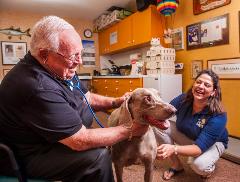As the COVID-19 pandemic continues to disrupt life around the world, many expats are returning home to weather the storm and take shelter in more familiar surroundings. For those with children there are the added complications of changing schools and the trauma of leaving friends behind, to say nothing of the family pets who may not be able to travel, at least not at the same time.
 Fewer flights and the consequent reduction in the number of animals being carried on each aircraft – typically one per trip instead of five – is making life difficult for families desperate to be reunited with their four-legged friends. Some are left with friends until a flight becomes available, while others are held in long-term boarding kennels at considerable expense to their fretting owners.
Fewer flights and the consequent reduction in the number of animals being carried on each aircraft – typically one per trip instead of five – is making life difficult for families desperate to be reunited with their four-legged friends. Some are left with friends until a flight becomes available, while others are held in long-term boarding kennels at considerable expense to their fretting owners.
Dr Walter Woolf, President and founder of Air Animal pet transporters in Tampa Florida said, “People are not taking up new overseas appointments at present and almost all our business has been repatriating families who are scared of getting caught in a lockdown situation overseas. Fear is very much driving the market and with so many flights being cancelled there is less capacity for pet transport.”
Air Animal has been transporting pets around the world for governments and the mobility industry since 1977 and has a lot of experience of dealing with challenging situations.
“We had a call from a large DSP company a few weeks ago asking us to repatriate a 70lb dog from Shanghai to upstate New York, that had been left behind by an expat family,” explained Dr Woolf. “Everyone said it was impossible, but we managed to get the dog on an Aeroflot flight with a two-day stop-over on a farm in Moscow! The family couldn’t believe it when the dog showed up and were absolutely delighted.”
Thankfully, as lockdowns around the world begin to ease, airlines are accepting more pet bookings to major destinations and Air Animal is urging customers to contact them as early as possible so that the pet’s vaccinations can be reviewed and be ready for when a flight becomes available.
Although information is limited, veterinarians generally agree that the transmission of the virus between other pets and people is low. Air Animal says that COVID-19 infections have been reported in a small number of animals around the world that had close contact with a person sick with COVID-19, but at this time, routine testing of animals is not recommended by the US Department of Agriculture and the Centers for Disease Control.
Nevertheless, airlines and Air Animal’s global network of service partners use cleaning, social distancing, masks and gloves as recommended by public health officials in their regions.
Expats needing to quarantine for 14 days after arriving home from abroad can book a door-to-door service and arrange for the pet to be delivered in a COVID secure way when the quarantine period ends.
In today’s world pets are very much a part of the family, especially when children are involved. At Air Animal they have a motto; ‘The move’s not complete until the pet arrives home’, sadly for some, during the pandemic it may take a little longer than usual.
Photo: Dr Walter Woolf and Jessica Nickler, International Pet Move Manager